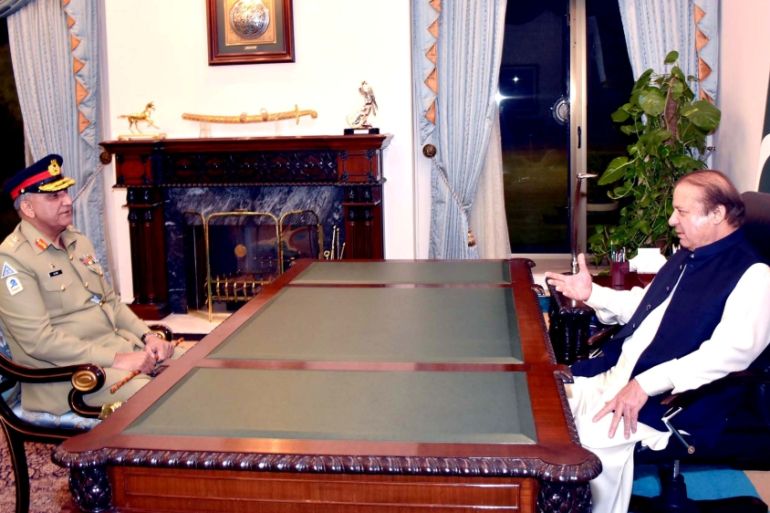Pakistan gets new COAS: General Qamar Javed Bajwa
Qamar Javed Bajwa replaces Raheel Sharif as powerful chief of army staff amid domestic and external security challenges.

General Raheel Sharif is due to step down next week as Pakistan’s COAS, or chief of army staff, when his three-year term expires on November 29.
In his place, Lieutenant-General Qamar Javed Bajwa has been appointed in a relatively uneventful transition in accordance with the constitution.
The change of guard at the top has been unusually smooth considering that the military has played a prominent role in Pakistan’s politics since its independence in 1947, staging three coups.
Bajwa’s appointment comes at a time when relations between India and Pakistan are under stress amid prolonged cross-border shelling along their international border.
In Pakistan, under the constitution, the prime minister is the head of the country’s executive, but the army controls domestic-security issues, the spy agency [the Directorate-General for Inter-Services Intelligence, better known as ISI] and the nation’s defence and foreign policies.
READ MORE: US must challenge Pakistan’s duplicity on Afghanistan
Saturday’s announcement by Nawaz Sharif, Pakistan’s prime minister, is being described by some analysts as amounting to placing Pakistan’s civil-military relations finally on an even keel.
|
|
“General Bajwa, whom I have met a few times, is someone who will not interfere a lot in the civilian government’s matters,” Lieutenant-General (retd) Talat Masood, a defence analyst, told Al Jazeera.
“He will no doubt give his advice on certain things but will not dominate the political scene, which will prove to be very helpful in terms of [the military’s] relationship with the [civilian] government.”
Bajwa was chosen over at least three contenders: Lieutenant-General Zubair Hayat, the army’s chief of general staff, who was previously responsible for the security of the country’s nuclear programme; Lieutenant-General Ishfaq Nadeem, commander of the II Corps, Multan, who was viewed by many as the favourite for the job; and Lieutenant-General Javed Iqbal Ramday, commander of the Bahawalpur Corps.
Bajwa’s current designation is Inspector General (training and evaluation) at the general headquarters of the Pakistan army, a position Raheel also held before he became the COAS.
Extensive experience
As a former general officer in command of the X Corps, Rawalpindi, the army’s largest, which is responsible for the area along the Line of Control (LoC), the de facto border dividing Indian and Pakistani-administered Kashmir, Bajwa is believed to have extensive experience in handling matters relating to the region and the northern areas.
With cross-border shelling along the LoC that began in September showing no sign of ebbing, Bajwa’s former military colleagues tell Al Jazeera, it is possible that he will try to arrange a ceasefire between the two sides.
Lieutenant-Colonel (retd) Muhammad Irfan, who served with Bajwa in 1984 in the Northern Light Infantry unit, which has the primary ground-operations responsibility for the northern areas, says Bajwa will “fight back with full force if the attacks from the other side of the border do not stop”.
READ MORE: Pakistan information minister removed over news report
“India is the one attacking our soldiers, killing civilians too, at the LoC. It is the [Indians] who are taking the heat, not us. So if India does not agree to the conditions of a ceasefire, or a ceasefire at all, I think Bajwa is someone who will take rapid action against it,” he told Al Jazeera.
On the other hand, Bajwa also served, in 2007, with a UN mission in the Democratic Republic of Congo as a brigade commander alongside Bikram Singh, an Indian general who was a UN forces division commander there before going on to become his country’s army chief.
Speaking to the New Indian Express daily, Ranjeet Rai, an Indian defence expert, said: “[Bajwa] takes over when a mortar war is going on between India and Pakistan along the international border and along the LoC.
“Now, he has two options: He can either stop terrorism or control the mortar firing from Pakistan or will he continue the old army chief’s policies.
“He will definitely carry General Sharif’s legacy forward and the decisions [Sharif] has taken to fight terrorism in the country. He is indeed a firm opponent of extremism and terrorism.”
![Raheel Sharif, right, retires on November 29, his successor already chosen by Nawaz Sharif [Caren Firouz/Reuters]](/wp-content/uploads/2016/11/7dbe0ba6e5494bd798995d5521068259_18.jpeg)
Pakistan’s Dawn newspaper says Bajwa may prove even more forceful in the fight against domestic armed groups than Raheel Sharif, who is credited with launching Operation Zarb-e-Azb in an effort to wipe out the fighters and their bases in North Waziristan.
Cleary, in his new post Bajwa will have his plate full, from the border tension with India and the escalating violence in Afghanistan to the increasing networking among homegrown armed groups and the implications of a Donald Trump-led US administration.
“There will be some minor differences here and there” between what Bajwa has done so far and what he will do as the COAS, Masood, the defence analyst, told Al Jazeera.
“However, we all know he has a very brilliant record of service.”